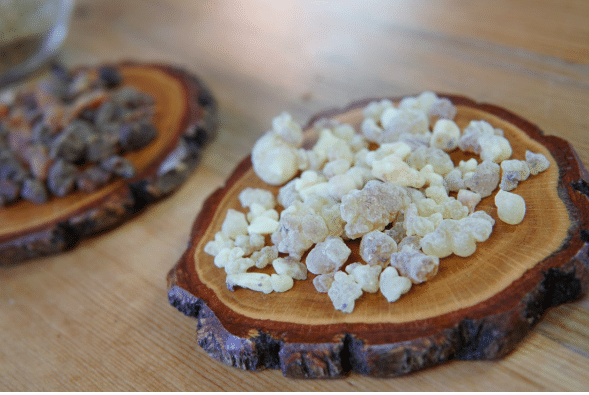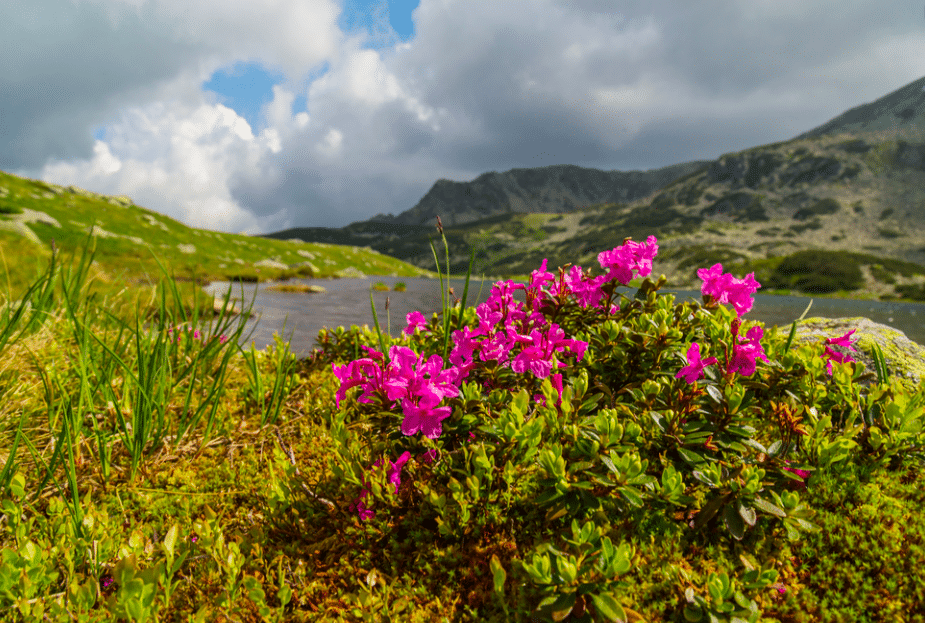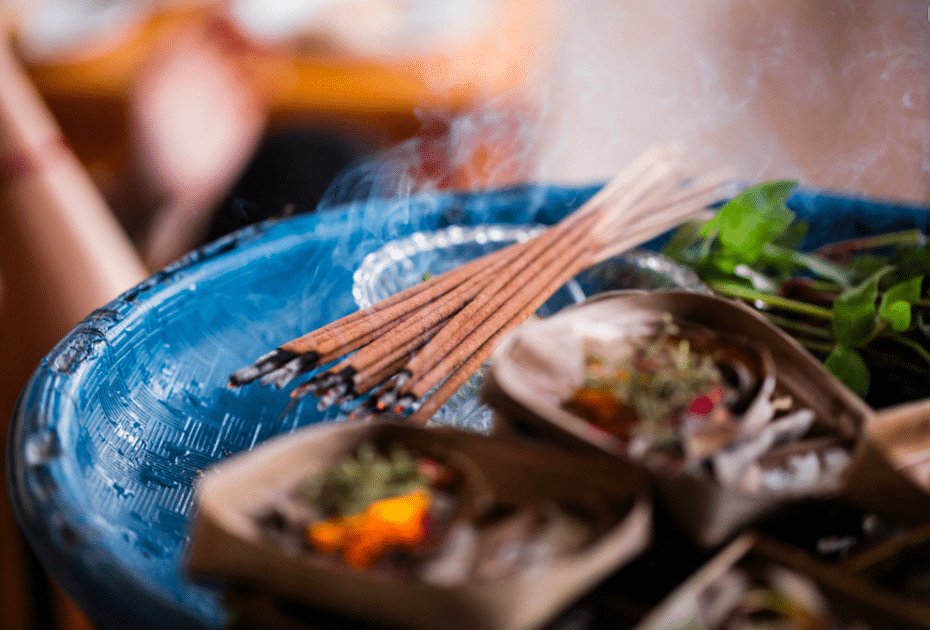
Since time immemorial, our sense of smell has been intrinsically connected to the sacred and divine, above all other senses. Across the Earth, the ancients considered our sense of smell to be our exalted sense. In many ancient religious and sacred texts, scent is almost always associated with a higher power, sacred offerings, and prayer. Whether in the form of incense, anointing oils, sacred perfumes, or other aromatic herbal concoctions, aroma is known to have the ability to bridge the gap between worlds, helping us achieve greater states of divine connection and spiritual attunement.
Fragrant offerings and incense are mentioned many times throughout the Bible, Talmud, the Book of Exodus, the Torah, the Ebers Papyrus, and other well-known spiritual literature, and in Biblical times, burning aromatic plants was thought of to be one of the highest forms of sacred offerings to God. This belief can be traced across every continent and throughout many different cultures. From ancient Egyptians to the Vikings of old, the burning of incense was a common show of reverence, honoring, and devotion.

The magic behind scent is certainly mysterious. Modern science has been able to explain a lot about its affects on the brain, memory, and emotion, but there's many aspects of our sense of smell that simply can't be explained by science. Its direct link to our intuition and spiritual or extraordinary experiences is above and beyond what can be uncovered in a lab.
In the Creation story of Adam and Eve, out of our five senses, scent is the only sense not mentioned as having been involved in the primordial sin of eating the fruit from the Tree of Knowledge. Avraham Sand says, “Eve ‘listened’ to the snake, ‘saw’ the good fruit, ‘touched’ it, and ‘tasted’ it. There is no mention of smelling the fruit..” As the Garden of Eden is portrayed as having the most beautiful and sensual aromas in existence, the absence of aroma in this infamous tale only reveals its conspicuousness.
In the story of Adam and Eve, it's also said that all of the senses of man, except the sense of smell, fell to a lower level of consciousness after Adam and Eve were cast out of the garden. From this part of the tale it's been decided by the Rabbis that the sense of smell still holds its original purity and holiness; as it were in the Garden of Eden: aroma will forever be an experience of the soul level.
Our sense of smell is the only one of our senses with a direct connection to the limbic system of the brain. All other senses are processed elsewhere before the information they gather is sent to the rational side of the brain as experience. The limbic system is the gateway to our intuition, memory, emotions, dreams, and higher consciousness. Since aroma is processed in this part of the brain, it has direct influence over these special aspects of our lives.
Because of this connection, using aromatic plants and incense in a conscious or sacred manner can be one of your most profound tools for personal growth and positive transformation. The experiential study of incense and aroma can take your aromatic work to the next level, helping you understand the plants and their philosophical, psychological, physiological, and spiritual medicine on much deeper levels.

The Roots of Aromatherapy
Today, the modern field of aromatherapy has grown into a very widespread modality. The use of plant-derived essential oils for health, wellness, and emotional wellbeing is recognized all over the world due to the fact that it works wondrously.
When a properly trained aromatherapist can effectively administer a safe application of essential oils, a patient may be assisted on many different levels, ultimately guiding them back towards natural balance and harmony. Aromatherapy is often used to successfully heal physical ailments by those with proper training, but its benefits are perhaps most profound when it's used for psychological and emotional healing, and spiritual transformation.
There are many in the field of aromatherapy who are not aware that the sacred art of incense is in fact the true Roots of Aromatherapy. Crafting and burning incense is an ancient practice dating back thousands of years prior to the distillation of essential oils. Today, incense is still used around the world for emotional well-being, psychological health, spiritual transformation, and even physiological healing in many renown systems of traditional medicine.
The art of incense and the practice of aromatherapy each have their virtues and indications, and I believe one is not more important than the other. Instead, they should both be understood equally by anyone interested in one or the other to help create a complete and holistic understanding of modern science and ancient healing wisdom.
Start Your Journey with a Free Ebook on ...
✨ The Art of Incense Crafting ✨

Are you ready to learn how to craft your own natural incense? This free eBook covers the essentials of creating incense that burns beautifully and smells divine, exploring its role as an ancient aromatic medicine and sacred ritual tool. Avoid common pitfalls and unlock step-by-step instructions to make incense cones with ease.
Regardless of which fragrant modalities you choose to work with, immersing yourself in the sensual world of aromatics is a magical journey for those that seek to learn how to unlock the spirit, emotions, mind, and intuitive faculties with the aid of aromatic plants. These plants are teachers and healers waiting to be discovered, waiting to share their wisdom and virtues with those who are willing to listen; not with their ears, but with their nose and their hearts, through the sacred sense of smell.
When you look back towards the foundations of healing with aromatics, to the Roots of Aromatherapy, you discover the ancients have known all along the powers and magic of aromatic plants. When you incorporate the ancient teachings and learn the ways of using incense and other traditional methods of application in your work with plants, or in your spiritual or healing practices, your experiences unveil new levels of transformation and wonder.
When you choose to initiate a more conscious connection with the aromatic plants or incense you use for various purposes, you begin to understand their virtues in new ways, deeper ways. Revelations awaken within you, your spirit is moved, and your emotions, thoughts, and feelings all begin to align at a higher level. It's for this reason aromatic plants and incense have been used across the Earth in nearly every culture, religion, and spiritual practice for millennia, and why the ancients have believed our sense of smell to be a sacred gift since the beginning of time.
Article by Evan Sylliaasen

Evan Sylliaasen is the founder of the Northwest School of Aromatic Medicine and Higher Mind Incense. For the past decade his incense company has been a leader in sustainability and conscious sourcing of aromatic plants. As the head instructor of his online school, he teaches aromatherapists, incense lovers, herbalists, and spiritually-minded folks the traditional art of incense crafting, incense as medicine, and the art of wild-harvesting aromatic plants responsibly.
Evan lives with his family in the foothills of the Olympic Mountains of Washington state. He channels his creative passions through writing, photography, wood working, craftsman building, and music. When he’s not working, he’s out in the garden, forest and fields, walking along rivers, beaches, or in the mountains breathing deeply.
© 2017 The Northwest School of Aromatic Medicine. All rights reserved.
*The statements above have not been evaluated by the FDA, and are for educational purposes only. This article is not intended to diagnose, treat, cure, or prevent any disease. This article should not be taken as medical advice. Please consult your physician before you use this information for health purposes.
